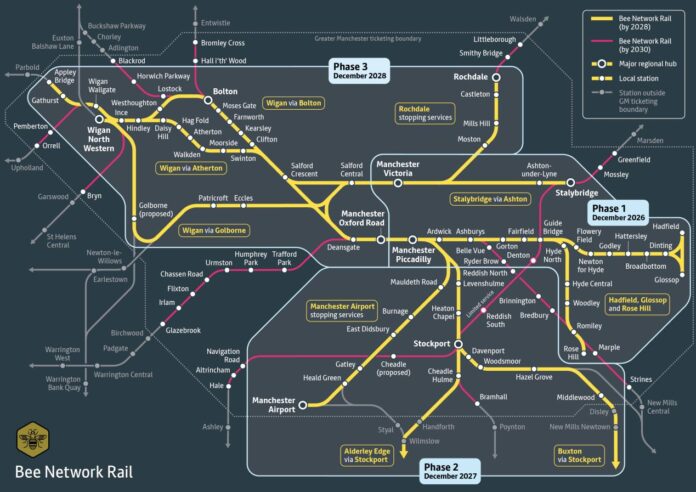Greater Manchester’s leaders want to work with government to deliver more local accountability over the city-region’s rail network.
They say doing so will unlock benefits for passengers, more growth opportunities and a full ‘London-style’ public transport system through the Bee Network.
Fresh from completing the delivery of bus franchising, in January Mayor Andy Burnham announced a three-phase plan to bring rail into the Bee Network by 2028. TfGM has this week taken a further leap forward, bringing in contactless ‘tap and go’ across bus and tram services, with new daily and weekly fare caps for passengers.
Today [27 March] members of the Bee Network Committee will meet to discuss the next phase of the city-region’s public transport network in more detail – specifically the rail reform needed at a national level. Leaders are also set to consider the proposal at tomorrow’s [28 March] Greater Manchester Combined Authority meeting in Oldham.
Greater Manchester is preparing its response to the government’s ‘A Railway Fit for Britain’s Future’ national consultation, which closes on 15 April. The submission will outline opportunities for rail improvements through greater devolution, including setting local fares, planning services across the 10 boroughs and developing underused land around stations.
The three-phase plan to integrate rail into the Bee Network has been drawn up in collaboration with the government and rail industry and will deliver major improvements to the city-region’s train stations and a more joined-up passenger experience. Such an approach would boost the number of trips by train in Greater Manchester by 1.3 million each year, with more people choosing public transport.
But, whilst the city-region holds some of the levers to make it happen – such as improving the experience for passengers with upgrades to stations, signage and customer information – fundamental reform is needed to give the city-region further powers to realise its plan in full.
The city-region wants to work with government to shape exactly what powers will be devolved to ensure greater local accountability and influence over service reliability, integration with other transport modes such as bus and tram, and a say on fares.
One of the first steps would be to bring in ‘tap and go’ payments on eight key commuter rail lines in the city-region. Greater Manchester wants to work with government to agree its longer-term plan to bring rail journeys within the daily and weekly fare caps introduced on bus and tram this week. It would mean passengers could reap the rewards when swapping between bus, tram and train, with an indicative peak cap on return travel from Glossop around £14.
Andy Burnham, Mayor of Greater Manchester, said:
“This is a once-in-a-generation opportunity to rewire how the railways are run, and we want to work with the government and Great British Railways to ensure our railways work for everyone and support regional and national growth ambitions.
“We’re already delivering change in Greater Manchester and have seen the positive benefit that greater local control and accountability for our tram, bus and active travel has had, with increasing numbers of people getting on board – but rail is the missing piece of the jigsaw.
“Our ambitious plans to integrate train services into the Bee Network will be transformative for the people who live in Greater Manchester. A Bee Network fare cap – including rail – would mean that people commuting into the city at peak times from Glossop could pay a cap of around £14 including return train travel as well as trips on buses and trams.
“Devolution is working for people in Greater Manchester, but we know that many other areas are at different stages of their journey. We want to ensure the government’s Railway Bill has enough flexibility as to the role we’ll play in this new era of rail – whether that’s having more of a say on service frequencies, making stations more accessible, deciding how much our passengers pay, and using the stations as a catalyst for regeneration.
“We know the government share our ambition to restore confidence and get more people choosing the train, and we’ve been really encouraged by our conversations so far on how things can be done differently.”







